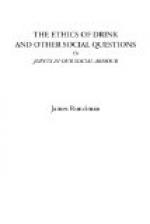of our big towns are a disgrace to all of us, but
if we closed 99 per cent. of them by Statute we should
have the same drunken crew left. While wandering
far and wide over England, nothing has struck me more
than the steady resolution with which men will obtain
drink during prohibited hours; the cleverest administrator
in the world could not frame a network of clauses
that could stop them; one might close every drink-selling
place in Britain, and yet those folks that had a mind
would get drink when they wanted it. You may ply
bolts and bars; you may stop the working of beer-engines
and taps; but all will be futile, for I repeat, that
only by asserting power over hearts, souls, imaginations,
can you make any sort of definite resistance to the
awe-striking plague that envenoms the world. With
every humility I am obliged to say that many of the
good people who aim at reform do not know sufficiently
well the central facts regarding drink and drinkers.
It is beautiful to watch some placid man who stands
up and talks gently to a gathering of sympathizers.
The reposeful face, the reposeful voice, the refinement,
the assured faith of the speaker are comforting; but
when he explains that he has always been an abstainer,
I am inclined to wonder how he can possibly exchange
ideas with an alcoholized man. How can
he know where to aim his persuasions with most effect?
Can he really sympathize with the fallen? He
has never lived with drunkards or wastrels; he is
apart, like a star, and I half think that he only has
a blurred vision of the things about which he talks
so sweetly. He would be more poignant, and more
likely to draw people after him, if he had living
images burned into his consciousness. My own set
of pictures all stand out with ghastly plainness as
if they were lit up by streaks of fire from the Pit.
I have come through the Valley of the Shadow into
which I ventured with a light heart, and those who
know me might point and say what was said of a giant:
“There is the man who has been in hell.”
It was true. Through the dim and sordid inferno,
I moved as in a trance for awhile, and that is what
makes me so keen to warn those who fancy they are
safe; that is what makes me so discontented with the
peculiar ethical conceptions of a society which bows
down before the concocter of drink and spurns the
lost one whom drink seizes. I have learned to
look with yearning pity and pardon on all who have
been blasted in life by their own weakness, and gripped
by the trap into which so many weakly creatures stumble.
Looking at brutal life, catching the rotting soul
in the very fact, have made me feel the most careless
contempt for Statute-mongers, because I know now that
you must conquer the evil of evils by a straight appeal
to one individual after another and not by any screed
of throttling jargon. One Father Mathew would
be worth ten Parliaments, even if the Parliaments
were all reeling off curative measures with unexampled
velocity. You must not talk to a county or a




